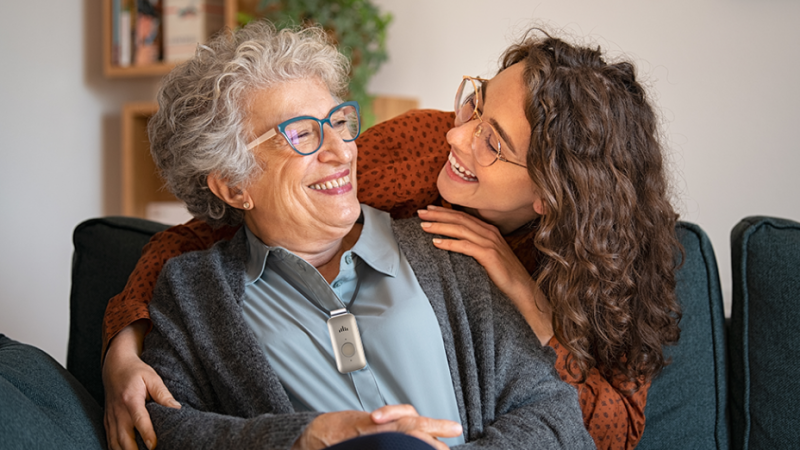The start of 2023 presents a fresh new opportunity to make changes to your habits. This is why setting a New Year’s resolution can be so powerful. Maybe you’ve been resolving to exercise more regularly or to get to the eye doctor for a new prescription. Both of these steps—and many others—can go a long way in helping you prevent falls inside and outside the home.
At Medical Guardian, our passion is fall prevention. But we also understand that changing any habit, including those that make you vulnerable to falling, can be hard. Here’s what you need to know about how to build a new habit, how to make simple changes in your life for the better, and how to prevent falls.
How Do You Build a New Habit?
When you’re resolving to build a new habit, it can be challenging to follow through. However, a habit does not become a habit without dedicated focus. Behavioral scientists have pinpointed these five key steps to building a new habit:[1]
1. Set your goal, and make it specific. For example, “I’m going to exercise on Mondays, Wednesdays, and Fridays.”
2. Find ways to remind yourself of your goal. For example, write out your intended exercise days on the calendar.
3. Make it fun and rewarding. For example, let yourself watch an entertaining show while riding the exercise bike.
4. Build flexibility into your plan. For example, give yourself the option of a morning or afternoon workout.
5. Harness the power of social support. For example, tell your friends about your plan to exercise three days a week so they can help encourage you and motivate you to stick with your goal.
By deliberately following these above steps, you can be well on your way to establishing a new habit that will stick over the long run.
How Simple Changes Can Improve Your Life
Just like building new habits, making changes in your life can be difficult. However, it helps to remind yourself that even the biggest changes start with just one small first step. With fall prevention, simple changes can help you avoid falling, and they can also help improve your overall quality of life. For example, simply by exercising a little bit more every week, you can improve your balance and coordination, which can help you prevent falls. Having more balance and coordination can also increase your confidence and independence, which can improve your daily experience of navigating the world and your overall quality of life.
How Do You Prevent Falls?
Experiencing a fall is not an inevitable event as you age. However, you can take steps to help avoid falling. If despite your best efforts, you do fall, you can have the best possible fall detection and action plan already in place.
Preventing falls starts with an audit of your habits:
-
Do you wear baggy clothing or pants that are too long? Ditching this habit, and updating your wardrobe, can help prevent ill-fitting clothes from getting in your way.
-
Do you routinely wear socks around the house? Make a habit of using slippers with grippy bottoms instead or even a dedicated pair of “inside shoes.” This is especially important if you have hardwood or laminate flooring, which can be slippery when wearing just socks.[2]
-
When was the last time you had your eyes checked? Making sure you have an appropriate prescription for glasses or contacts can help you stay safe and avoid falls.
-
How often do you exercise? Prioritize 30 minutes of daily exercise so that you can stay flexible and mobile and reduce your chances of losing your balance.
-
Do you intentionally transfer from one task to another? Being mindful as you get in and out of cars, approach sidewalk curbs, and go through entryways can help keep you safe. Make sure to keep one hand free during these transitions, move slowly, and focus on the transition at hand instead of attempting to multitask.[3]
After auditing your habits, assess your environment as well. Remove clutter from the most traversed areas of your home. Ensure that rugs are secured, lightbulbs are changed routinely, and you have sturdy handles to grip in areas where you may need them.
Anticipating a Future Fall
Sometimes, even with the best habits and prevention, you may fall. But there is a “golden hour” after a fall. This means that the sooner you can get help after a fall, especially within the first hour, the more likely you are to survive the fall and be able to return to your independent living. Having a Medical Alert device from Medical Guardian on hand is an important part of a fall prevention plan. These devices can serve as an added layer of security so that you can get help if and when you need it. Some of our devices, such as the lightweight Mini Guardian, even have fall detection technology, which can send a medical alert on your behalf if you cannot do it yourself.
At Medical Guardian, we understand the importance of fall prevention. Making simple changes to your daily habits can greatly impact your overall quality of life. Our top-rated medical alert systems provide several benefits to keep you well. To learn more, contact us today.
References:
[1] How to build a habit in 5 steps, according to science. CNN Health. Nov 29, 2021. https://www.cnn.com/2021/11/29/health/5-steps-habit-builder-wellness/index.html
[2] Guide to Fall Prevention. Medical Guardian. https://cdn.medicalguardian.com/assets/pdf/medical-guardian-fall-prevention.pdf?utmmedium=Email&utmcampaign=website&utm_source=Email
[3] Change your habits to prevent falls. Ohio Department of Aging. https://aging.ohio.gov/care-and-living/health-and-safety/fall-prevention/form-new-habits-1

